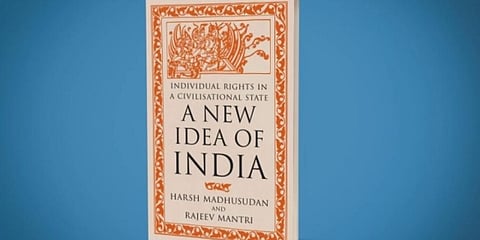

Seventy five years is a time to unapologetically revel in accomplishments. But a post-independent India, just shy of its 75th birthday, must begin at the beginning, correcting the foundational principles starting with individual rights, argue Harsh Madhusudhan and Rajeev Mantri in their book A New Idea of India: Individual Rights In A Civilizational State.
The authors place immense belief in equality aiding economic growth, and how the lack of it kept the country impoverished for decades. They give us an essential reminder that India is a civilisational State and not just a post-colonial entity, whose journey is traced highlighting all that has been wrong with secularism, socialism, welfarism and liberalism that we practice today, and what it actually should be. And because almost every debate invariably gets a caste and religion tint, the authors drive home a fundamental fact that the opposite of secularism is not communalism, but theocracy.
Take secularism. All individuals are equals, but the State has been discriminating citizens based on religion, caste, class and language clearly to consolidate minority votes, they argue. This has seen need-based welfare ceding way to identity-based socialism, but in the end as we see it now, the so-called Nehruvian form of governance running almost uninterrupted since independence has failed to deliver prosperity.
The issue of whether groups should supersede individual rights is as old as the hills, so that's not the baffling part. What's more concerning is that, even today, there's hardly any intellectual and constructive dialogue on the outcome of pseudo-secular and socialist economics exacerbating social divisions. In contrast, one is branded communal if one doesn't support State welfare based on religion, the authors note.
The duo also channel much energy into the unsettling and illiberal double standards, while making the case for something as basic as why the role of shaping the society shouldn't be in the hands of the State. For long, there have been fundamental flaws deliberately subjecting one group to reforms, and hypocritically leaving out minorities. In essence, such a divisive construct threatens to wither individual identities. Just consider how and why polygamy is deemed socially harmful for the majority community but not for minorities and why State control over Hindu places of ownership alone isn't a violation of the very principles of secularism.
At the heart of the book lies a dispassionate attempt to distinguish nation-State, State-society, and Hindutva-Hinduism. This is important as India is at a turning point and post-Covid starting 2021 could be its make-or-break time to reposition itself in the geopolitical order. The book thus is timely with its thought-provoking question: What is the idea of India? Should religious groups have special rights over and above individual rights that all citizens enjoy in a free, democratic India?
As LK Advani once noted, a Hindu rashtra and a secular state are virtually synonymous and playing by the ear, the authors argue that the Hindutva movement should desire an end of religion and caste-based personal laws. That's because, in a market system, discrimination hurts all, often unequally.
The book neatly sliced into five chapters offers a view on most hot-button issues from Uniform Civil Code to abrogation of Article 370. While championing an overhaul of the judiciary, downsizing of ministries, administrative reforms, it also has policy prescriptions and makes the case for genuine liberalism including rule of law, open markets, and separation of religion and State.
It's reference-rich citing multiple authors old and new, though one would have liked the level of discussion seen in the first two chapters maintained throughout. The flow is simple, which means you can finish it in a sitting or two, but commands complete attention.
As for the ending, there simply isn't one. Perhaps the authors hope for a stimulating discourse to begin as soon as readers leave the book.
| Book: A New Idea of India: Individual Rights in a Civilisational State Author: Harsh Madhusudan, Rajeev Mantri Publisher: Westland Price: Rs 577 Pages: 361 pages |